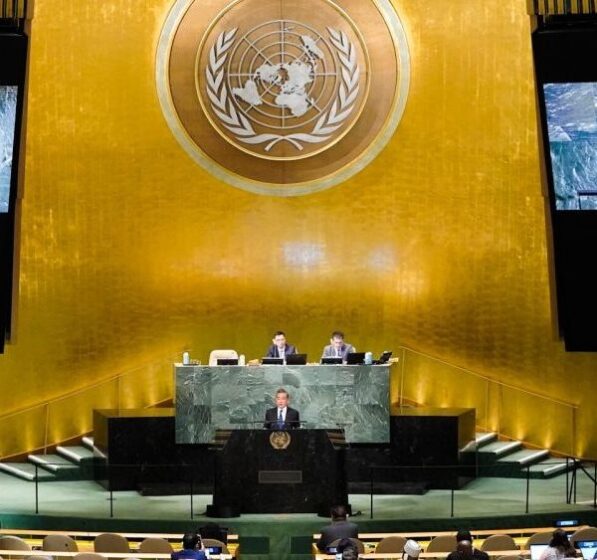
Dr. Ramzy BAROUD
In anticipation of next month’s United Nations Security Council talkson reforming the naturally antiquated and inefficient political body, China’s diplomacy chief, Yang Yi, mentioned his nation’s demands.
“The reform of the Security Council must maintain fairness and justice, increase the representation and voice of establishing countries, permitting more small and medium-sized nations to have more chances to take part in the decision-making of the Council,” Wang Yi statedin a statement on April 29.
More specifically, the brand-new UNSC needs to “redress historic oppressions against Africa”.
Although calls for reforms of the UNSC have actually been made many times in the past, Beijing’s position is especially important in both language and timing.
When the United Nations was foundedin 1945 following The second world war, it was implied to mark the increase of a brand-new world order, one that was mainly dominated by the winners of that dreadful war, providing greater influence to the United States and its Western allies.
Indeed, of the 51 charter member of the UN back then, 5 countries were selectedto serve completely on the Security Council– the executive branch of the UN. The rest were offered membership in the General Assembly, which played a marginal and, sometimes, even symbolic role in world affairs.
6 other nations were allowedto act as non-permanent members of the Council, though they were not approved the same veto power held and worked out by the 5 effective UNSC members only.
A couple of years later, in 1963, the non-permanent membership status, served through annual rotations, was expandedto 10, making the total number of 15 UNSC members. However, the ‘reforms’ ended there, never to be revisited.
The UN was hardly ever a democratic platform, relatively showing the realities of the world, whether based on financial impact, demographics or any other indications– aside, obviously, from military may and political hegemony.
From the post-WWII geopolitical realities, nevertheless, the UN perfectly expressed an unfortunate, unjust, but also somewhat real worldwide power paradigm.
That paradigm, however, is now shifting, and quickly so.
Calls for reforms have actually been underway for many years, reflectedin the activities of the Group of Four (G4)– Brazil, Germany, India and Japan– for instance; and theSirte Statementof the African Union (AU) in 2005, to name a few. However the renewed calls for reforming the UN in recent months have actually become louder, more substantial and, undoubtedly, more possible.
The Russia-Ukraine war, which has divided the world into political camps, further empowered China– the world’s soon-to-be biggest economy– and emboldened lots of nations in the Middle East, Africa and South America.
Of the many indications of a worldwide power shift, the BRICS countries– Brazil, Russia, India, China and South Africa– have provento be the greatest success story in difficult Western dominance over worldwide markets and the status of the dollar as the world’s main currency.
As BRICS prepares for a significant subscription growth, it is poised to end up being the world’s leading financial online forum– ahead of the effective G7.
One of the BRICS members, India, as of April 2023, overtookChina to become the world’s most populous nation. In addition to China and the combined demographics and wealth of other BRICS countries, it ends up being unacceptable that a BRICS member like India, is still not a long-term member of the UNSC. The exact same reasoning applies to Brazil.
India’s UN Ambassador, Ruchira Kamboj, just recently referredto the UN Charter as “anachronistic”. “Can we practice ‘efficient multilateralism’ by safeguarding a charter that makes five nations more equal than others and supplies to each of those 5 the power to ignore the collective will of the remaining 188 member states?” Kamboj stated during a debate on the UN Charter.
Naturally, she is right. Her logic, however, carries much higher weight now that her country– along with other BRICS countries, the collective power of the African Union among other nations and political entities– remains in a much stronger position to plan on substantive modification.
China, on the other hand, is already an irreversible UNSC member and a holder of the veto power.
The fact that Wang Yi is demanding severe modifications at the UN, particularly in the makeup of the Security Council, is an effective sign of China’s brand-new worldwide diplomacy agenda. As an increasing superpower with close and deepening ties with numerous nations in the Worldwide South, China rightly believes that it remains in its interests to require inclusion and reasonable representation for others.
This is an unmistakable sign of political maturity by Beijing, which will undoubtedly be withstood by the United States and other European powers.
The West is keen on either maintaining the UNSC’s West-leaning status as it is, or, if it must, taking part in superficial or self-serving reforms. This would be inappropriate for China and the rest of the Global South.
The UN’s reputation is already in tatters following its failure to deal with global conflicts, climate modification, global pandemics and more. If not reformed to attend to international obstacles through more democratic ways meaningfully, the UN will risk its future relevance, if not its extremely existence.

